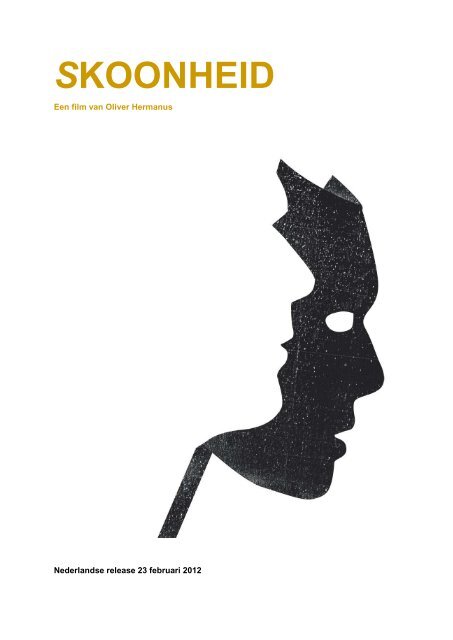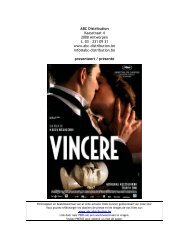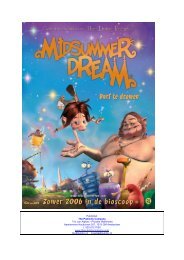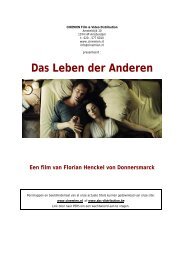SKOONHEID - Cinemien
SKOONHEID - Cinemien
SKOONHEID - Cinemien
Create successful ePaper yourself
Turn your PDF publications into a flip-book with our unique Google optimized e-Paper software.
<strong>SKOONHEID</strong><br />
Een film van Oliver Hermanus<br />
Nederlandse release 23 februari 2012
<strong>SKOONHEID</strong> SYNOPSIS<br />
Gevangen in een verstikkend huwelijk en een onderdrukkende samenleving is Francois (Deon Lotz) te<br />
bang om eerlijk naar zichzelf en de wereld te zijn. Totdat hij verliefd wordt. <strong>SKOONHEID</strong> is een<br />
indringend meesterwerk over een hartverscheurende zoektocht van een man naar liefde.<br />
Het Zuid-Afrikaanse <strong>SKOONHEID</strong> beleefde zijn wereldpremière op het filmfestival van Cannes 2011 (Un<br />
Certain Regard) en kreeg er staande ovaties en lovende recensies. Hoofdrolspeler Deon Lotz won<br />
voor zijn rol op het filmfestival van Zürich de Golden Eye for Best Performance. Op het internationale<br />
filmfestival van Durban won de film de prijs voor Beste Zuid-Afrikaanse Speelfilm en de Juryprijs. Het<br />
is de eerste Afrikaans-gesproken film die in Cannes te zien was en won daar de Queer Palm.<br />
Elisabeth Quin (jury-voorzitter): ‘Skoonheid is a disturbing, radical film, real cinema…’<br />
Skoonheid/99 minuten/Zuid-Afrika, 2011/Afrikaans en Engels gesproken<br />
<strong>SKOONHEID</strong> wordt in Nederland gedistribueerd door ABC/ <strong>Cinemien</strong>. Beeldmateriaal kan gedownload<br />
worden van: www.cinemien.nl/pers of vanaf www.filmdepot.nl<br />
Voor meer informatie kunt u zich wenden tot Gideon Querido van Frank: +31(0)20-5776010 of<br />
gideon@cinemien.nl
<strong>SKOONHEID</strong> CAST EN CREW<br />
Deon Lotz Francois van Heerden<br />
Charlie Keegan Christian Roodt<br />
Michelle Scott Elena van Heerden<br />
Albert Maritz Willem Roodt<br />
Sue Diepeveen Marika Roodt<br />
Roeline Daneel Anika van Heerden<br />
Director Oliver Hermanus<br />
Producer Didier Costet<br />
Co-producer Dylan Voogt<br />
Executive producer Marvin Saven<br />
Writer Oliver Hermanus<br />
Director of Photography Jamie Ramsay<br />
Editor George Hammer
<strong>SKOONHEID</strong> OLIVER HERMANUS<br />
De in Kaapstad geboren Oliver Hermanus behaalde zijn Bachelor of Arts voor Film, Media en Visuele<br />
Studies aan de Universiteit van Kaapstad. Na zijn afstuderen werkte hij als persfotograaf bij een<br />
nationaal persbureau in Zuid-Afrika. In 2006 bood Hollywoodregisseur Roland Emmerich (INDEPENDCE<br />
DAY) Hermanus een beurs aan, zodat hij zijn Master kon behalen aan de Londen Film School. Zijn<br />
afstudeerfilm SHIRLEY ADAMS, die Hermanus al op zijn 15 e schreef, ging in première op het Locarno<br />
International Film Festival van 2009.<br />
Filmography<br />
2011 Skoonheid<br />
2008 Shirley Adams<br />
2007 Yunna (korte film)<br />
2007 Interior (korte film)<br />
2005 The Second Floor (documentaire)
<strong>SKOONHEID</strong> DIRECTOR’S NOTE<br />
This story is very much the exploration of one man’s self-destruction. His disdain for himself. His<br />
hatred. We are privy to the different, compartmentalized sections of his life, his secrets and his<br />
desires. We witness his violence, his fears, his anger en his jealousy.<br />
Francois should not be easily dimissed or relegated to being a ‘negative character’. My intention as the<br />
filmmaker is to explore his contorted and troubled existence in showing his tragedy and his brutality<br />
without judging him. The reality of this character in post-apartheid South Africa is that he represents a<br />
minority grouping in a country that was ruled by the minority for centuries and now is ruled by the<br />
majority. Francois speaks a language that is not spoken in any other part of the world, he has a<br />
heritage that is stigmatized as being racist and hateful. He was raised to be wary of the black man and<br />
to embrace conservative values. He lives in a city that was once the capital of this regime, and is still a<br />
bastion of its former glory. Francois fears the country he lives in because he is perceived as the guilty<br />
party, the color of his skin, the language he speaks, the blood that runs through his veins are all<br />
symbols of a brutal and unjust past. The collective guilt and subconscious need to defend their<br />
heritage are what most conservative Afrikaners battle with everyday.<br />
And beyond this, Francois, like millions of men around the world, is humiliated and ashamed of his<br />
sexual preference. The combination of these imploding tensions and the mastery of his ability to<br />
control his emotions is the starting point of this film. Seeing how his life works, how he has<br />
psychologically mapped his life, secrets and emotions.<br />
Then, we witness as he suddenly loses control of his boundaries and breaks his own rules. We follow<br />
him on a journey that is not uncommon – we have all been the victim of unrequited love, and are<br />
bound to a character who, at the age of 45 year old, is exploring his wants and pursuit of happiness for<br />
the first time. A journey that is conflicted and laced with self-loathing.
Francois has the habit of watching people, of being a voyeur, always guarding his true thoughts and<br />
intentions. Visually I would adopt this character trait and allow the audiences to witness moments and<br />
sequences as Francois. To be completely connected to him and given equal chance to interpret<br />
moments and gestures as he does.<br />
Furthermore, my intention is to document situations and details of contemporary South Africa as I see<br />
them – the still very present double standards of conservatism, that masks outdated racist ideologies,<br />
the cosmopolitan and almost surprising sexual underground of Cape Town and then most importantly<br />
a comment on ‘skoonheid’. Christian, the object of Francois’ affection, is a man born with psychical<br />
form and beauty that gives him power in the world. It gives him currency to manipulate and take from<br />
the world what he wants. Francois is in turns disarmed and disgusted by Christian’s power. He wants<br />
to be him with him, own him, ‘have him’, yet the ease with which Christian floats through life, the<br />
charm of his form enrages Francois to the core. It is this conflicted reaction in Francois that becomes<br />
the centre of his downfall and the element of this situation that is most central to my intentions socially<br />
and politically.<br />
This journey is psychological above all else, we are privy to the workings of a man who goes beyond a<br />
point of no return, who crosses a moral barrier and who realizes that he knows nothing of love or<br />
happiness. That he knows nothing about joy, and in the end, a man who has no character, no true<br />
self, because everything that he built up around him – his wife, his children, his secrets and lies have<br />
rendered him lost, without any hope of freedom.
An impressively controlled study of a macho Afrikaaner and the secret he hides from his<br />
family, his friends and himself, Beauty (Skoonheid) is a slow-paced but effective portrait of a<br />
kind of apartheid of the mind. It’s also a dour and uncompromising arthouse product which will<br />
play to a wafer-thin audience at home in South Africa - where the director’s debut, Shirley<br />
Adams, barely made a dent in the box office. Further festival action looks like the most obvious<br />
next step after the film’s Cannes premiere, though resilient audiences in Europe and elsewhere<br />
may also be persuaded to take a look.<br />
His is a refreshing new voice in a territory known up to now more for its township dramas.<br />
Reminiscent of a certain strain of austere Latin American cinema that includes Carlos Reygadas<br />
(Silent Light) and Rodrigo Moreno (El Custodio), the film derives much of its force from the way<br />
structure, rhythm and framing play the same tense waiting game that the protagonist himself is<br />
engaged in. A lot of weight is placed on the performance of Deon Lotz, and he rises to the challenge,<br />
investing Francois, the frustrated family man at the centre of the story, with a thermonuclear mass of<br />
repressed energy.<br />
Lotz is Francois, who lives in Bloemfontein, in South Africa’s Afrikaaner heartland. He’s a big, bullish<br />
guy who we first see at a wedding reception, also attended by Christian (Keegan), the son of an old<br />
friend. It’s only in retrospect that we realise that the camera’s slow prowl through the room, and its<br />
predatory focus adjustment and zoom in on pretty-boy Christian, is Francois’ point of view: even after<br />
we’ve identified Francois as the film’s centre of attention, he gives little away.<br />
He’s married to Elena (Scott), though they seem not to have a physical relationship. He owns a lumber<br />
company and sawmill, and from certain comments he lets drop we suspect he might be a racist. When<br />
he drives to a farmstead meeting with a group of tongue-tied roughnecks, we assume it’s a white<br />
supremacists’ hoedown, especially when one of the group is turned away because he has broken their<br />
“no faggots or coloureds” rule by arriving with a fey black boy in tow.<br />
So it comes as a shock when in the very next scene we see Francois and his beer-swilling pals<br />
engaged in an orgy while gay porn plays on the TV. They’re hard, homophobic men who like to have<br />
sex with each other, before (like Francois) going back to their families, going to church and behaving<br />
like regular guys. But Francois’ can’t stop thinking about Christian - a trainee lawyer whose sideline as<br />
an advertising model leads the older man to convince himself that he too may be living in the<br />
Afrikaaner closet.<br />
The film’s dramatic tension lies not in the explicit content of many of the scenes but in the set of the<br />
protagonist’s mouth and his alert, needy but downcast eyes; or in little details in the corner of the<br />
scene, often out of focus - a mixed-race couple on the beach, a happy gay couple flirting in a gay bar<br />
where Francois sits drinking, filled with self-hatred - or the archive newspaper cutting on the wall of a<br />
restaurant that reads FREE AT LAST. It’s still a testing ride for the audience, and Hermanus doesn’t<br />
quite know how to end the film; but his is a refreshing new voice in a territory known up to now more<br />
for its township dramas, at least on the international festival stage.
A closeted married man roiling with tension develops a disturbed obsession with his friends'<br />
son in Oliver Hermanus' well-modulated sophomore feature, "Beauty." In contrast with several<br />
Cannes 2011 titles, this time the object of attraction is legal, though power dynamics are very<br />
much present in the way the protag behaves toward the young man and the world -- an<br />
especially South African world. Displaying satisfying progress from his award-winning debut,<br />
"Shirley Adams," Hermanus demonstrates a firm grip on the subtleties of strong-willed folk in<br />
turmoil. "Beauty" needn't get trapped in the gay ghetto.<br />
Producer and co-scripter Didier Costet is also behind Brillante Mendoza's last few titles, which means<br />
his arthouse connections could help "Beauty" find a modest spot on specialty screens, notwithstanding<br />
the difficulty of launching South African films in the international market. One relatively graphic sex<br />
scene however may make Stateside release difficult without a tiny bit of trimming.<br />
A marvelously controlled opener signals Hermanus' decision to privilege his lead's voyeurism, as the<br />
camera slowly tracks through a crowded wedding party and alights on Christian (model Charlie<br />
Keegan). Though Francois (Deon Lotz) has known him for years, something about this sighting strikes<br />
a chord. Returning to Bloemfontein, in central South Africa, after his daughter's wedding in Cape<br />
Town, Francois and wife Elena (Michelle Scott) get on with their lives, characterized by a paper-thin<br />
facade of familial contentment.<br />
Beneath Francois' taut manner lies an emasculated figure, an angry white man in South Africa, no<br />
longer a member of the ruling elite, maintaining his racism along with a disgust for homosexuals that<br />
barely masks his self-loathing. Francois satisfies his urges with a small group of older, like-minded<br />
closeted men, but as an outlet for his overall anxiety, these orgies don't do the trick. Instead he<br />
pretends to go on a business trip to Cape Town, where he meets up with Christian's parents and<br />
begins spying on the young man.<br />
"Beauty" is an oddly generic title, especially as Christian, through the voyeuristic lensing, becomes<br />
more than merely a pretty body. Though presumably straight, his physical ease around other men, no<br />
matter their color, is an element that inspires an angry envy within Francois, who watches his<br />
obsession with the realization that Christian's palpable comfort within himself cannot be a part of his<br />
world or generation. As Francois' frustration builds, so too does his resentment, leading to inevitable<br />
violence.<br />
Hermanus doesn't dwell too much on the unhappiness of suburban life, although it's an inescapable<br />
element that adds to Francois' bitterness. Lotz gives a quietly intense performance, very much the<br />
observer rather than participant -- a concept strikingly matched by Jamie Ramsay's watchful lensing,<br />
handsomely shot in Scope on a Red Mysterium. Attractive lighting provides a honeyed glow to most<br />
settings and especially Christian, while Francois is lit with an appropriately steelier gleam. Sound and<br />
music are used with a sophisticated sense of counterpoint and cover.






